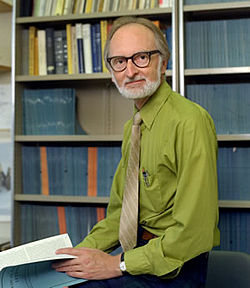- Owen Chamberlain
-
Owen Chamberlain 
Owen ChamberlainBorn July 10, 1920
San Francisco, California, USADied February 28, 2006 (aged 85)
Berkeley, California, USANationality United States Fields Physics Institutions Los Alamos National Laboratory Alma mater Dartmouth College
University of California, Berkeley
University of ChicagoKnown for Particle physics Notable awards Nobel Prize in Physics, 1959 Owen Chamberlain (July 10, 1920 – February 28, 2006) was an American physicist, and Nobel laureate in physics for his discovery, with collaborator Emilio Segrè, of antiprotons, a sub-atomic antiparticle.
Biography
Born in San Francisco, California, Chamberlain graduated from Germantown Friends School in Philadelphia in 1937. He studied physics at Dartmouth College, where he was a member of Theta Chi Fraternity, and at the University of California, Berkeley. He remained in school until the start of World War II, and joined the Manhattan Project in 1942, where he worked with Segrè, both at Berkeley and in Los Alamos, New Mexico. He married Beatrice Babette Copper (d. 1988) in 1943, with whom he had four children.
In 1946, after the war, Chamberlain continued with his doctoral studies at the University of Chicago under legendary physicist Enrico Fermi. Fermi acted as an important guide and mentor for Chamberlain, encouraging him to leave behind the more prestigious theoretical physics for experimental physics, for which Chamberlain had a particular aptitude. Chamberlain officially received his Ph.D. from the University of Chicago in 1949.
In 1948, having completed his experimental work, Chamberlain returned to Berkeley as a member of its faculty, where he, Segrè, and other physicists investigated proton-proton scattering. In 1955, a series of proton scattering experiments led to the discovery of the anti-proton, a particle exactly like a proton except negatively charged. Chamberlain's later research work included the time projection chamber (TPC), and work at the Stanford Linear Accelerator Center (SLAC).
Chamberlain was also politically active on issues of peace and social justice, and outspoken against the Vietnam War. He was a member of Scientists for Sakharov, Orlov, and Shcharansky, three physicists of the former Soviet Union imprisoned for their political beliefs. In the 1980s, he helped found the nuclear freeze movement.
Chamberlain was diagnosed with Parkinson's disease in 1985, and retired from teaching in 1989. He died of complications from the disease on February 28, 2006, in Berkeley at the age of 85.
References
External links
- Owen Chamberlain
- The Nobel Prize in Physics 1959
- Short Bio at Berkeley
- Guide to the Owen Chamberlain Papers at The Bancroft Library
- New York Times obituary
Nobel Laureates in Physics (1951–1975) - Cockcroft / Walton (1951)
- Bloch / Purcell (1952)
- Zernike (1953)
- Born / Bothe (1954)
- Lamb / Kusch (1955)
- Shockley / Bardeen / Brattain (1956)
- Yang / T. D. Lee (1957)
- Cherenkov / Frank / Tamm (1958)
- Segrè / Chamberlain (1959)
- Glaser (1960)
- Hofstadter / Mössbauer (1961)
- Landau (1962)
- Wigner / Goeppert-Mayer / Jensen (1963)
- Townes / Basov / Prokhorov (1964)
- Tomonaga / Schwinger / Feynman (1965)
- Kastler (1966)
- Bethe (1967)
- Alvarez (1968)
- Gell-Mann (1969)
- Alfvén / Néel (1970)
- Gabor (1971)
- Bardeen / Cooper / Schrieffer (1972)
- Esaki / Giaever / Josephson (1973)
- Ryle / Hewish (1974)
- A. Bohr / Mottelson / Rainwater (1975)
- Complete list
- (1901–1925)
- (1926–1950)
- (1951–1975)
- (1976–2000)
- (2001–2025)
Categories:- 1920 births
- Members of the United States National Academy of Sciences
- 2006 deaths
- American Nobel laureates
- American physicists
- Dartmouth College alumni
- Deaths from Parkinson's disease
- Experimental physicists
- Manhattan Project people
- Nobel laureates in Physics
- University of California, Berkeley faculty
- University of Chicago alumni
Wikimedia Foundation. 2010.
